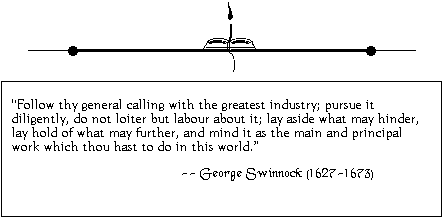

With this study, we continue our examination of the prologue of John's Gospel.
15John testifies concerning Him. He cries out, saying, "This was He of whom I said, `He who comes after me has surpassed me because He was before me.'"
In the previous verse, John reminded us that "the Word" was not just a speculative philosophical idea, but the True and Living God who came to earth: who "became flesh", and who "made His dwelling among us" (vs. 14). John reminded us that there were eyewitnesses of "the Word", Jesus Christ: men and women who walked with Him, spoke with Him, were taught by Him. As John said: "We have seen His glory" (vs. 14).
One of the greatest witnesses to the glory of Christ was John the Baptist. The Gospel writer John speaks here of John the Baptist: "John [the Baptist] testifies concerning Him. He cries out, saying, `This was He of whom I said, "He who comes after me has surpassed me because He was before me"'" (vs. 15). In this verse, John (the Gospel writer) tells us three things about John the Baptist: what he does ("testifies concerning Him"), how he does it ("He cries out"), what he says ("This was He of whom I said..."). Let's look at each of these.
First, what John the Baptist does is: "John testifies concerning Him." God has chosen primarily to use His people to make Himself known to the world. Even when Christ walked the earth, though He Himself taught about the kingdom of heaven, He sent His disciples out to testify about Him and preach the good news of the Gospel (see Matt. 10; Luke 9; Luke 10). And in the book of Acts, the Holy Spirit did not Himself testify directly of Christ, but indwelt and empowered believers to preach Christ. That God uses men to teach the world of Him is a great privilege to us, who have the honor of sharing in the work of God.
John the Baptist, in testifying concerning Christ, was fulfilling God's purpose for Him. John (the Gospel writer) told us earlier concerning John the Baptist: "There was a man who was sent from God; his name was John. He came as a witness to testify concerning that light, so that through him all men might believe" (vss. 6-7). Now, here in verse 15, we see that John the Baptist was fulfilling God's purpose for him because, indeed, he did "testify concerning that light". It is a great thing, and more than that, the reason for our existence, to fulfill the purpose of God in our life. There is no more important thing for us to do.
Note finally, that John was very effective in fulfilling this purpose, so effective that John uses the present tense: "John testifies..." John the Baptist not only "testified", but he continues to "testify", even now, two-thousand years after he walked the earth.
Second, John (the writer of this Gospel) tells us how John the Baptist testifies, that is: "He cries out..." The word used here "cries" signifies a LOUD exclamation, made without any reservation. John the Baptist was not shy about proclaiming Christ. This was his purpose in life, and he let everyone know. He didn't think twice, he wasn't concerned about possibly offending anyone, he simply and loudly, without any reservation, cried out, proclaiming the preeminence of Christ. Oh, that we would proclaim Christ so boldly, without reservation, for all to hear, with no concern about what others might think.
Third, John (the Gospel writer) tells us what John the Baptist testifies: "This was He of whom I said, `He who comes after me has surpassed me because He was before me.'" John the Baptist speaks kind of enigmatically here, as if to force us to meditate upon this statement, as if to say: "Stop. Think. Figure this out." Basically, there are three points to what John is saying: Christ was prophesied; Christ is preeminent; Christ was preexistent. Now, let's look at each of these:
First, Christ was prophesied. John the Baptist says: "This was He of whom I said..." John the Baptist here is referring back to some prophecies that he himself made even before Christ showed up on the scene. Later in this chapter, we learn that John made this statement when he saw Jesus at the beginning of His ministry, just before He started calling His disciples (see John 1:30). So, before Jesus even started His public ministry, John was prophesying about Him. John's role in prophecy was to prepare the way for Christ, as we learn in the Gospel of Matthew: "[John] is he who was spoken of through the prophet Isaiah: `A voice of one calling in the desert, "Prepare the way for the Lord, make straight paths for Him."'" (Matt. 3:3). A very valuable proof that Christ is who He said He was is that, not only was He Himself prophesied to come when He did, but John the Baptist was prophesied to prepare the way for Him.
Second, Christ is preeminent. John the Baptist says: "He who comes after me has surpassed me..." Christ "came after" John the Baptist in two ways. First, Christ was born about six months after John (see Luke 1:36). Second (and more significantly), John the Baptist preceded Christ in His ministry. John's ministry in baptizing the people and encouraging them to repent from their sins was enormously successful. Mark tells us: "The whole Judean countryside and all the people of Jerusalem went out to him. Confessing their sins, they were baptized by him in the Jordan River" (Mark 1:5). At the height of John's ministry, Christ began His. Usually, the earlier teachers were considered greater; but John knew, even though Christ "came after" John in His ministry, that Christ was preeminent. John's own disciples were not so clear on this point. They came to him, complaining that Christ was "stealing away" John's disciples: "Rabbi, that man who was with you on the other side of the Jordan--the one you testified about--well, He is baptizing, and everyone is going to him" (John 3:26). John replied: "He must become greater; I must become less. The one who comes from above is above all" (John 3:30-31). John deferred to Christ, just as all ministers of God must defer to Christ. Christ is preeminent. All service from ministers of God must have the goal of turning people to the Lord Jesus Christ. All attention must be focussed on Him, not the minister of God. All honor must be His. He alone must be exalted. This is the duty of the minister of God.
Third, Christ was preexistent. John gives this as the reason that Christ is preeminent: "...because He was before me." Wait. John has just said that Christ "came after" him. We have established that Christ "came after" John in His birth, and Christ "came after" John in His ministry. So, when John says, "...because He was before me", John must be referring to the preexistence of Christ. John the Baptist is confirming what John, the writer of this Gospel, said early in his prologue: "[The Word] was with God in the beginning" (John 1:2). Contrary to the religious beliefs of many people, we did not exist in soul or body before this life. All men were "formed" by God in the womb (see Eccl. 1:5; Isa. 44:2; et. al.). Of those who walked the earth, Christ was the only one who existed beforehand. Paul tells us: "He is before all things" (Col. 1:17). Christ Himself told us: "I tell you the truth. . . before Abraham was born, I am" (John 8:58). His preexistence was a distinguishing trait of the Messiah, as prophesied in the Old Testament: "But you, Bethlehem Ephrathah, though you are small among the clans of Judah, out of you will come for me one who will be ruler over Israel, whose origins are from of old, from ancient times" (Micah 5:2). Christ's preexistence implies Christ's divinity. Only God is "from everlasting to everlasting" (Ps. 41:13). And so also, Christ's preexistence implies Christ's preeminence. John the Baptist, the greatest of all the prophets (see Matt. 11:9-11), understood this: the preexistence of Christ, the preeminence of Christ, the Deity of Christ, the Lordship of Christ. May we also, by the Holy Spirit, understand these things.
